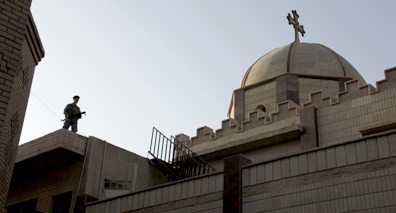Posted on March 29, 2013 by Baron Bodissey
The following editorial was published on Wednesday in the Danish daily Jyllands-Posten, and has been kindly translated for Gates of Vienna by Henrik Ræder Clausen

Persecuted Christians
During Easter of 2003, the invasion of Iraq had already begun, designated by President George W. Bush as a crusade against terrorism — bringing up memories of the Christian Crusades from 1096 to 1272, and the words of Pope Urban II about the necessity of holy war against the infidels.
In particular among militant Islamists, whose ambition is to bring down Christianity as such.
Christianity lives on as the world’s largest religion. Of all the faith systems on earth, it remains the largest, with over two billion adherents, more than one third of all religious persons in the world. Islam is the second largest with 1.6 billion believers. And the influence of Christianity is growing, not least in China, where the number of Christians — in spite of their problems in the most populous country of the world — is projected to reach 400 million in 15 years’ time.
But Christianity is under threat in many countries, not least in the same Iraq that was the target of the war initiated by President Bush after the terrorist attacks in New York and Washington.
Since the invasion began, more than 70 Christian churches in Iraq have been bombed, over 700 Christians have been killed, 17 of these being priests, and an unknown number of Christians have been abducted. On Maundy Thursday of 2003, there were over one million Christians in Iraq. Today only one third of them remain, and most of those have needed to take refuge in the autonomous Kurdish regions in northern Iraq. Many have fled abroad. For years they have been unable to visit their relatives in Iraq.
But Christians also suffer difficult circumstances in countries other than Iraq. In most of the Middle East, the region that gave rise to the Bible, where Jesus lived and died as a person of the Middle East, Christianity is under pressure. Acutely in Bashar al-Assad’s Syria, where the Apostle Paul gave Christianity roots outside of the Jewish world, and in Iran, where non-Muslims are forced to “submit or leave the country”.
Lebanon used to be a harmonious center for Christians, Muslims and Jews. It is now an Iranian vassal state, where Hezbollah, particularly in south Lebanon, is striving to remove every Christian cross, and where churches dating back to the time of the Apostle Paul have been torched, torn down or converted into mosques.
In Palestinian-controlled Gaza, Hamas is calling for “Islamic purity”, while Christian clinics are being shut down on the pretext that they are spy centers. In Egypt a couple months ago, a woman and her seven children were sentenced to fifteen years in prison for converting from Islam to Christianity — a warning of what Christian Egyptians may expect from the Muslim Brotherhood — and in Tunisia, militant Muslims cut the head off a young man who converted to Christianity. In Saudi Arabia, Bibles are being confiscated, while churches and Christian symbols are banned.
At the end of 2012, the English think tank Civitas warned of the dangers threatening Christians in the Middle East, and of the continuing silence about the violence and repression targeting them, not only in the Muslim Middle East, but also in Africa and Asia. It is deeply worrying that Western leaders are watching in silence while Christianity is persecuted in the part of the world where it arose.
And it is a regrettable fact that this silence about persecution of Christians in Muslim countries is a likely consequence of the fears harbored by Western leaders that any criticism will be interpreted as religious racism. And that in these years, the divisions between Christian and Islamic believers are being deepened.
No comments:
Post a Comment